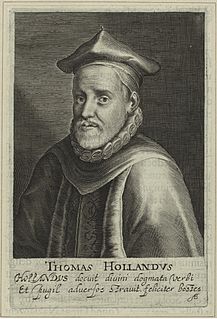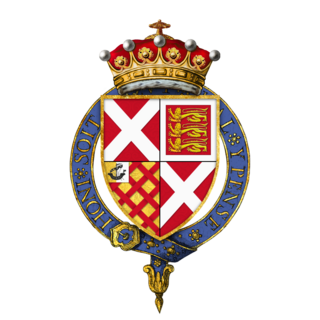Related Research Articles
Sir Richard Baker was a politician, historian and religious writer. He was the English author of the Chronicle of the Kings of England and other works.

Sir Julius Caesar was an English lawyer, judge and politician who sat in the House of Commons at various times between 1589 and 1622. He was also known as Julius Adelmare.

Edward Somerset, 4th Earl of Worcester, KG, Earl Marshal was an English aristocrat. He was an important advisor to King James I, serving as Lord Privy Seal.

Sir James Whitelocke SL was an English judge and politician who sat in the House of Commons between 1610 and 1622.

Bernard Barton, born in Carlisle, Cumberland, England, was known as the Quaker poet. His main works included The Convict's Appeal (1818), in which he protested against the death penalty and the severity of the criminal code.

George Horne was an English churchman, academic, writer, and university administrator.

Sir Henry Neville was an English courtier, politician and diplomat, noted for his role as ambassador to France and his unsuccessful attempts to negotiate between James I of England and the Houses of Parliament. In 2005 Neville was put forward as a candidate for the authorship of Shakespeare's works.

Thomas Holland was an English Calvinist scholar and theologian, and one of the translators of the King James Version of the Bible.
Sir William Hussey of Sleaford, Lincolnshire, SL was an English lawyer who served as Attorney General and as Chief Justice of the King's Bench.

John Clifford, 7th Baron de Clifford, also known as John, Lord Clifford, 7th Lord of the Honor of Skipton, KG, was an English peer. He was killed at the siege of Meaux, France.
Sir John Shelton, courtier, of Shelton near Norwich, Norfolk, England, was, through his marriage, an uncle of Henry VIII's second wife, Anne Boleyn. Sir John was appointed comptroller of the joint household of the King's daughters, Mary and Elizabeth. Sir John and Lady Shelton were also Governor and Governess to the King's children.

Ralph Neville, 4th Earl of WestmorlandKG, was an English peer and soldier. He was the grandson of Ralph Neville, 3rd Earl of Westmorland, and the father of Henry Neville, 5th Earl of Westmorland.
Rowland Searchfield (Roland) was an English academic and bishop.
Roberto Gentili was a translator into and from multiple languages and the son of sir Alberico Gentili. He started his university education at the age of eight, graduated at the age of twelve and became a Fellow of All Souls College, Oxford at the age of seventeen, below the minimum age, by special dispensation.
Ralph Kettell (1563–1643) was an English college head, the third President of Trinity College, Oxford. In a long tenure he built up the college both in terms of architecture and its academic reputation.
John Harding was an English churchman and academic. He was Regius Professor of Hebrew at Oxford from 1591 to 1598, and President of Magdalen College, Oxford, from 1607. He was also involved in the translation of the Authorized King James Version, becoming leader of the First Oxford Company of translators after the death of John Rainolds.
Henry Atkins (1558–1635) was an English physician.
Ralph Eure, 3rd Baron Eure, of Ingleby and Malton, Yorkshire, was an English nobleman and politician. The surname, also given as Evers, was at that time probably pronounced "Ewry".
General James Cudworth was one of the most important men in Plymouth Colony. He served as Deputy to the Plymouth General Court (1649), Commander of militia in King Philip's War (1675–8), Assistant Governor and Deputy Governor (1681–2) of Plymouth Colony, and Commissioner to the New England Confederation.
Anne Whitehead or Anne Downer; Anne Greenwell was an English Quaker organizer, preacher and writer. She underwent severe distraints for her beliefs.
References
 This article incorporates text from a publication now in the public domain : "Hutchinson, Ralph". Dictionary of National Biography . London: Smith, Elder & Co. 1885–1900.
This article incorporates text from a publication now in the public domain : "Hutchinson, Ralph". Dictionary of National Biography . London: Smith, Elder & Co. 1885–1900.